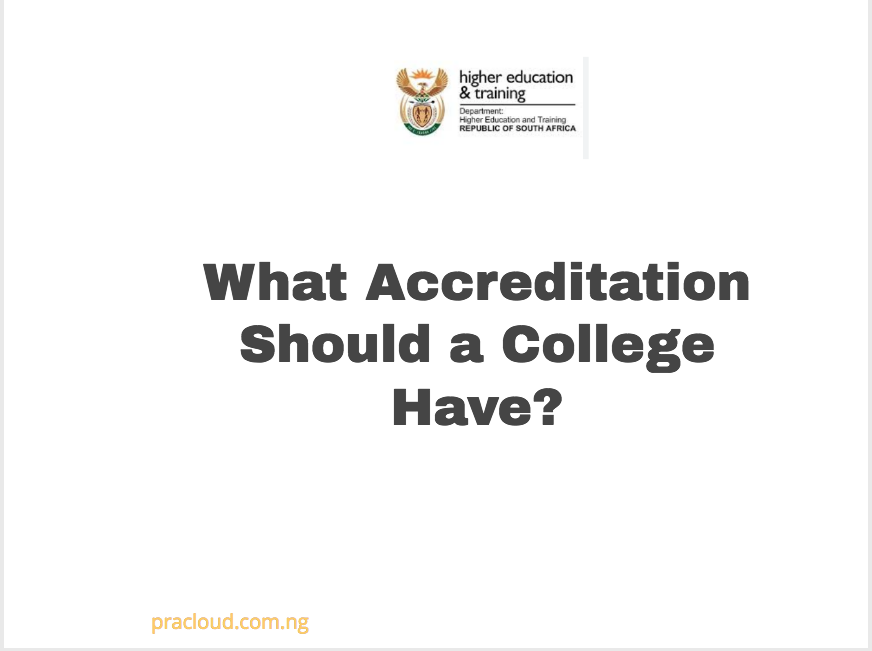What Accreditation Should a College Have?
What Accreditation Should a College Have?
What Accreditation Should a College Have?
Choosing a college is one of the most important decisions a student can make, and one key factor to consider is accreditation. Accreditation is a process through which an independent organization evaluates a college or university to ensure it meets certain quality standards. This process helps confirm that the education provided by the institution is valuable, credible, and recognized by employers and other academic institutions.
In the United States, colleges usually seek accreditation from regional or national accrediting bodies. Regional accreditation is generally considered more prestigious and is granted to academically oriented, non-profit institutions. There are seven regional accrediting agencies, such as the Higher Learning Commission (HLC) and the Middle States Commission on Higher Education (MSCHE), depending on the geographic location of the college. National accreditation, on the other hand, is often awarded to vocational, technical, or career-based institutions. While both types of accreditation are legitimate, credits from regionally accredited schools are more widely accepted for transfer and graduate school applications.
In addition to institutional accreditation, many colleges also seek programmatic or specialized accreditation for specific departments, such as nursing, engineering, business, or education. These accreditations, given by professional organizations, ensure that individual programs meet industry standards and adequately prepare students for the workforce or certification exams.
Before enrolling, students should verify that a college is accredited by an agency recognized by the U.S. Department of Education or the Council for Higher Education Accreditation (CHEA). Accreditation affects financial aid eligibility, credit transfer, and even job prospects after graduation. Ultimately, attending an accredited college assures students that they are investing in a quality education that will be recognized and respected.
Types of Accreditation a College Must Have
National accreditation-National accreditation organizations concentrate on accrediting career programs that grant certificates and degrees, as well as trade and vocational institutions. There are numerous nationally acknowledged accreditation agencies, including:
- Association for Biblical Higher Education (ABHE)
- Association of Advanced Rabbinical and Talmudic Schools (AARTS)
- Council on Occupational Education (COE)
- Distance Education Accrediting Commission (DEAC)
- National Accrediting Commission of Career Arts and Sciences (NACCS)
- Accrediting Council for Independent Colleges and Schools (ACICS)*
- Distance Education & Training Council (DETC)
- Accrediting Commission of Career Schools and Colleges (ACCSC)
- Council on Occupational Education (COE)
- Transnational Association of Christian Colleges and Schools, Accreditation Commission (TRACS)
- Accrediting Council for Continuing Education and Training (ACCET)
Programmatic accreditation-Programmatic accreditation, sometimes known as “specialist accreditation” or “professional accreditation,” is a third type of certification that prospective students should consider while assessing institutions. Programmatic accrediting institutions assess individual academic units, programs, or disciplinary offerings to make sure they are giving students a quality education in a particular field of study, in contrast to national and regional accrediting agencies, which evaluate higher education institutions as a whole.
Since these agencies examine all programs nationally within a given specialty, such as business schools or nursing programs, programmatic accreditation occurs frequently at the national level. Compared to the national institutional accreditation discussed above, this sort of national programming accreditation is different./ regional vs national accreditation
Regional accreditation-Regional accreditors frequently concentrate on educational institutions that are state-owned or nonprofit (like National University).
State-owned or nonprofit colleges and universities that emphasize academics are governed by regional accreditation agencies.
In the United States, six regional bodies accredit institutions of higher learning.
These institutions are in charge of the institutions in their specific groups of states. / regional vs national accreditation
The six agencies are:
Higher Learning Commission (HLC)
AR, AZ, CO, IO, IL, IN, KS, MI, MN, MO, ND, NE, OH, OK, NM, SD, WI, WV, WY
Southern Association of Colleges and Schools (SACS)
FL, GA, KY, LA, MS, NC, SC, AL, TN, TX, VA
U.S. students in Mexico, the Caribbean, Central America, and South America
Western Association of Schools and Colleges (WASC)
CA, HI
The Hawaiian territories of Guam, American Samoa, Northern Marianas Islands, the Federated States of Micronesia, Palau, the Pacific Rim, East Asia, and parts of the Pacific and East Asia
Middle States Commission on Higher Education (MSCHE)
NY, NJ, PA, DE, MD, Washington D.C.
New England Association of Schools and Colleges (NEASC)
CT, ME, MA, NH, RI, VT
Northwest Commission on Colleges and Universities (NWCCU)
AK, ID, MT, NV, OR, UT, WA
Contact details
Tel No
(012) 312 5348 / 082 471 2358
E-mail
Maseti.B@dhet.gov.za
OTHER RELATED
- How do I know if my degree is accredited?
- Is Up Open for the second semester of 2026?
- How do you verify if a college is accredited?
- Is it bad if a school is not accredited?






